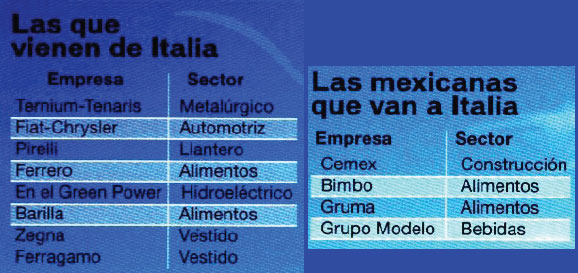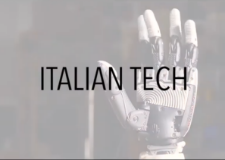Despite the upheavals caused by the global economic crisis unleashed in 2008 and from which Europe has not yet recovered, Italy is currently reorganizing its government with the departure of Silvio Berlusconi, and is developing a great industrial activity. The automotive companies, agriculture and tourism stand out, which has allowed Italy to occupy the fifth place among the seven most industrialized nations in the world.
The tourism sector stands out, not only for its architecture and other cultural riches accumulated over several centuries in various parts of its territory and its natural beauties, but also for its gastronomic and wine variety and for having one of the cities that receives the most people in the world: Rome, for being the seat of St. Peter's Basilica and the Sistine Chapel in Vatican City, Italy being the third country of the European Union that receives the most visitors in the year.
But these jewels are not the only attractions of Rome; among its most visited places are the Trevi Fountain, Piazza Navona, the Roman Forum, the Colosseum and Castel San Angelo, among others. In fact, the tourism sector in the Italian capital employs 60.3% of its working population.
With a privileged geographical location in the Mediterranean Sea, as part of its territory the boot-shaped nation includes two islands: Sicily and Sardinia, and as proof that the tourism sector is one of the most important in the growth of the national economy, suffice it to say that its contribution with 43.7 million tourists per year reaches a total of 42,700 million dollars generated.
On the other hand, Italy has a large production of olives and vines, being the first world producer of wine internationally recognized for its top quality, but today in the livestock and agricultural sector its production is not able to supply the food demand of its population and is forced to import various products.
Among the most developed industrial sectors are the production of pasta, canned food, pizza dough, tomato sauces and olive oil. It also participates in other sectors such as fashion, clothing and footwear, in addition to glass production, the automotive sector, bicycles and motorcycles, and railway equipment.
CARGO WITH A TRADE DEFICIT
In spite of the accumulation of Italian products that enjoy great acceptance in international markets, in terms of foreign trade its volume is currently in deficit.
Its industrial exports are of luxury automobiles or popular consumer goods, which some, without solid foundations, consider to be of low quality, motorcycles, mechanical constructions, clothing, footwear, foodstuffs and wines. Among its main clients are Germany, France and Spain. On the other hand, Italy imports cell phones, engineering products, sunglasses, minerals, clothing, beverages, tobacco and, above all, various foodstuffs.
The behavior of inflation and the distribution of the Gross Domestic Product (GDP) are two of the most important concerns today.
However, after the severe setbacks suffered by the national economy as a result of the global crisis, it is expected that its GDP will gradually recover and although the number expected for this year is not enough to set the bells ringing, it is expected to grow. In fact, it is estimated that in December it will be close to 0.8 percent.
FROM ITALY WITH LOVE
Italy is currently Mexico's second largest European supplier, Germany is the first and Mexico's 10th largest trading partner worldwide. The amount of Italy's annual exports to Mexico is around five thousand 221 million dollars.
Almost 80% of Italy's exports to Mexico are made up of goods such as machinery, metallurgical products, plastics, chemicals, electrical appliances and the remaining 20% is made up of consumer goods such as clothing, fabrics, footwear, jewelry and medicines.
On the other hand, Mexico exports to Italy chemical products, automatic and electrical machinery, vehicle engines, frozen fish and legumes. Thanks to the European Union-Mexico Free Trade Agreement (EU-Mexico FTA), there are new export opportunities with tariff advantages.
The ties between both nations do not stop there, Italy is the 10th country of the European Union to invest in Mexico; in the last 10 years Italian companies established here have invested 523.5 million dollars. There are 1,094 Italian companies registered that invest in Mexico and they are of different sizes: large, medium and small.
Foreign Direct Investment (FDI) from Italy has been destined 55.80% to the manufacturing sector, 38.10% to the services sector, 4.9% to commerce and 1.2% to the construction sector.
Italy invests in Mexico mainly in the automotive, furniture manufacturing, electric motors, hotel and residential construction.
AUSTERITY IS A MUST
The current crisis affecting the entire world has forced Italy to take economic austerity measures; the current government proposes a budget adjustment plan, such measures will help to save 45,500 million euros: 20,000 million euros in 2012 and 25,500 million euros in 2013.
In order to achieve this, it is proposed to make cuts in the funds allocated to local and regional entities, which will allow lowering costs; therefore, the suppression of provinces with less than 300,000 inhabitants and 3,000 square kilometers of surface area was approved. It is also proposed to increase taxes to those who earn more than 90 thousand Euros, as well as to those who have financial yields which are catalogued as important.
Another of the measures would be the freezing of the salaries of civil servants, the limit on the use of flights except for the presidents of the government. The introduction of the health co-payment, where patients would have to pay 10 euros for specialists and 25 euros for emergencies, in addition to an increase in the retirement age.
These measures are intended to balance the numbers for 2014. Thus, Italy is a country with which Mexico should continue to maintain a long-term economic relationship.
ITALY INVESTS IN MEXICO IN SECTORS SUCH AS AUTOMOTIVE, FURNITURE, ELECTRIC MOTORS AND CONSTRUCTION OF HOTEL AND RESIDENTIAL COMPLEXES
Source: http: //ols.uas.mx/fen/gestione/Desp_Arts.asp?titulo=493


























